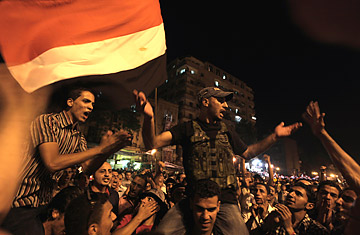
Egyptian protesters chant slogans during a demonstration in Tahrir Square, in Cairo, Egypt, Friday, July 8, 2011.
Tens of thousands of Egyptians packed into Cairo's iconic Tahrir Square on Friday for another sun-drenched protest in favor of "freedom and justice," as many described it. Activists formed security cordons and ID checks at the edges of the square. Across vast stretches of pavement, young revolutionaries led crowds in chants of "Down with the Marshall!" — meaning Field Marshall Mohamed Tantawi, the chief of Egypt's ruling Supreme Council of the Armed Forces.
But many others had come for different reasons — most falling under a general category of frustration that change hasn't happened quickly enough since the popular uprising that ousted President Hosni Mubarak in February.
A group of young Salafis — adherents of a strict, purist interpretation of Islam — who had mobilized on Facebook, stood in the square wearing uniforms evocative of those worn by employees of Costa Coffee, a high-end cafe. "We're not just in the mosque. We also sit in cafes," explains Waleed Mustafa, an electrical engineer. "We're just showing that the Salafis are part of the nation."
Others came with messages of religious solidarity across the Muslim-Christian divide. Poor Egyptians and labor groups came with economic demands, complaining of high prices and high unemployment. The April 6th Youth Movement passed out fliers calling for speedy trials of ex-regime members — and price control. Muslim Brotherhood members passed out water and juice. Educated liberals reiterated their desire for a new constitution before electing a new parliament. Others complained about each other.
Liberals accused the Muslim Brotherhood of sabotaging the protest by leaving early. Others questioned the Islamists' motives. "I think the Muslim Brotherhood came today because all the other parties are here," said a Cairo leatherworker who declined to give his name. "Right after the revolution, they gained strength, but now they're weakening."
The popular Islamist group — and Egypt's only political organization with a grassroots following — had sat out recent protests. But for this demonstration, the Brotherhood turned out in force, with some even smugly predicting that the crowd might have only been half as big without them. "We came to protect the revolution, because a lot of the ministers have escaped without prosecution," said Ayman al-Naggar, a teacher and Brotherhood member who came with several dozen other group members from Damietta on Egypt's Mediterranean coast. "Get rid of corruption in the Interior Ministry, and speed up Mubarak's prosecution," he said, listing his top two demands.
Meanwhile, the crowd was dotted with individual grievances. Ra'ya Mohamed, sat in the shade, holding a picture of her 17-year-old son, Ahmed, throughout the day. Ahmed was killed by a policeman's stray bullet in Cairo on Jan. 28, the deadliest day of the uprising. And Mohamed had forced her way into the trial for the officer, Tamer Saleh, on June 18 — in time to witness Saleh walk in, speaking casually on his cell phone, before the trial was adjourned until September. "I'm just asking for a fair trial. He's supposed to be in jail, but he's not. It's because the [old] system is still in place."
Many have echoed Mohamed's anger after police clashed violently with protesters supporting "the martyrs' rights" late last month. But some have come to Tahrir with specific ideas for how a system capable of such cruelty and corruption could or should be reformed. Al-Naggar said he'd like to see control of the Interior Ministry taken over by the country's military rulers, a proposal likely to make most youth activists cringe. A group of men from Minya, in southern Egypt, said they would like to do away with the Interior Ministry entirely; instead the government should hand law enforcement to local, tribally-based committees. "Upper Egypt is tribal so it should be governed by tribal law," said Ali Ismail, 35, a construction worker.
By sunset, many protesters had declared the largely peaceful protests a success, albeit a vague one. The revolution continues, trumpeted tech-savvy activists on Twitter. It's unclear the extent to which Egypt's military rulers will hear them. But most protesters seemed to agree that continued protest is the only way to be sure. "I'm not optimistic that anything will happen unless there's more pressure on the system," said Ahmed al-Baz, a student seated beneath a vast white tent in the square's center. "We need to gather more people — a million or two million."
